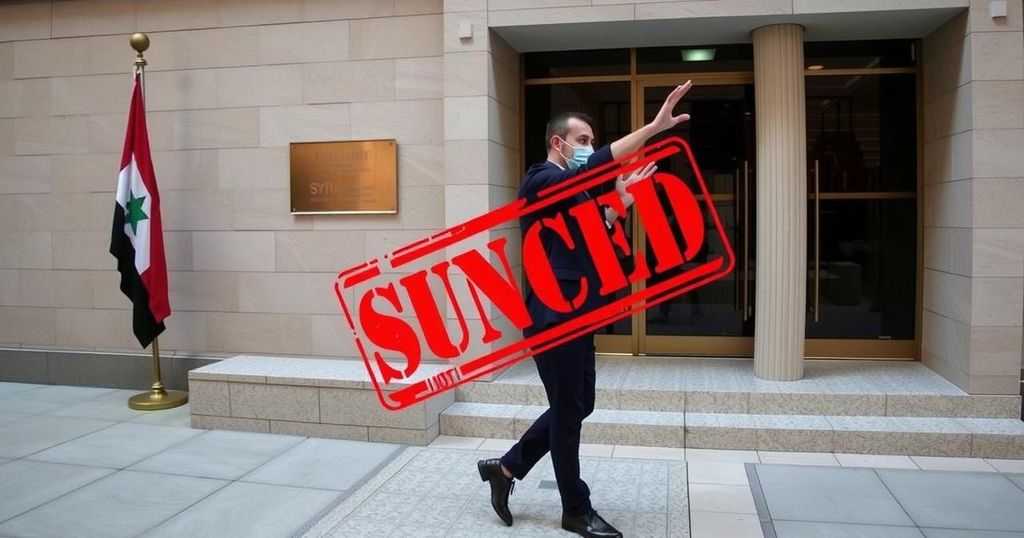Syria’s embassy in Lebanon has suspended consular services after relatives of Bashar Assad were arrested with forged passports. Additionally, 70 Syrians, including former army officers, were handed over to Syria’s new regime, complicating regional dynamics and provoking protests advocating for women’s rights in the new governance structure.
On Saturday, Syria’s embassy in Beirut announced a suspension of consular services, following the apprehension of two relatives of former President Bashar Assad at Beirut airport, who were allegedly carrying forged passports. The suspension was ordered by the Syrian foreign ministry and did not specify the reason for this decision. Observers speculate that the actions stemmed from issues surrounding the legitimacy of the passports after Assad’s relatives were implicated in a scandal involving forged documentation connected to the embassy.
In a connected development, Lebanese authorities transferred approximately 70 Syrians, including former Syrian army officers, to the newly established Syrian government led by the former insurgent group, Hayat Tahrir al-Sham (HTS). This apprehension occurred as these individuals were caught entering Lebanon illegally, with credible reports confirming their handover to Syrian officials. Meanwhile, delegations from regional nations, such as Libya and Bahrain, have begun forging diplomatic ties with Syria’s new leadership.
The HTS leader has managed to alleviate concerns both domestically and internationally regarding fears of retribution against communities perceived to have supported the Assad regime. Nonetheless, escalating tensions arise as clashes between HTS forces and pro-Assad factions endure, highlighting ongoing instability in the region. Additionally, verbal hostility continues between Kurdish-led groups and Turkey-backed militias in northeastern Syria, indicative of the complex geopolitical landscape following the recent transition in Syrian governance.
The United States has addressed these developments, with Secretary of State Antony Blinken reiterating the need for a Syrian-led political process centered on human rights and inclusivity. Concurrently, demonstrations led by Kurdish women in northeastern Syria have spotlighted the demand for women’s rights within the new governance framework, reflecting concerns about the potential rise of Islamist extremism under the new authority. Activists assert the necessity for constitutional recognition of women’s roles in order to safeguard their rights in the evolving political climate.
The recent suspension of consular services by Syria’s embassy in Lebanon highlights the increasing tensions related to governance and control within the Syrian state following the civil conflict. The involvement of Lebanese authorities in handing over detainees to a new Syrian regime, led by the HTS, signifies shifts in regional alliances and the complexities of governance amid ongoing unrest. Tensions between various factions, particularly between pro-Assad and HTS forces, reflect a continued struggle for power in Syria, while the Kurds remain apprehensive about the evolving military and political landscape involving Turkish influences.
In summary, the suspension of services by Syria’s embassy follows serious allegations of document forgery linked to relatives of Bashar Assad. Concurrently, Lebanon’s transfer of Syrians, including former military officers, to the HTS-led government showcases the shifting allegiances within the region. The U.S. has emphasized supporting a political process that promotes inclusivity, while Kurdish groups continue to advocate for women’s rights in a landscape marked by uncertainty and potential extremist enforcement. This series of events underscores the critical need for stable governance in post-war Syria.
Original Source: www.newsday.com






